Halloween can be safe and spooky
When it comes to Halloween, it’s all about fantastic costumes and yummy treats. But Tammy Franks, senior program manager of Home and Community Injury Prevention with the National Safety Council cautions it’s also a day for overlooking the normal safety precautions we usually take. With children more than twice as likely to be hit by a car and killed on Halloween than any other day of the year, it’s important to make safety a priority with these Halloween safety tips.
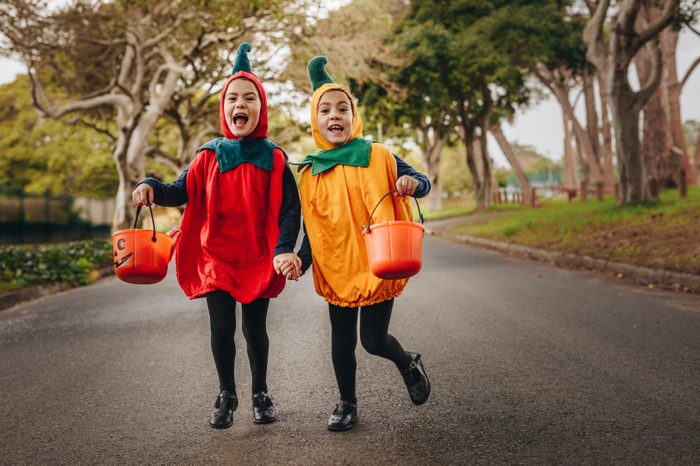
Halloween safety tips
1. Choose visibility over cuteness
Whether you’re wearing a store-bought or homemade costume, making sure others can see you when it’s dark out is numbers among crucial Halloween safety tips. That means wearing bright colors and/or adding reflective tape, or glow-in-the-dark headbands or bracelets. Glow bracelets and necklaces work great too—just keep them away from younger children. “You need something that makes your child visible, even if their costume isn’t,” says Ali Raja, MD, executive vice chairman of the Department of Emergency Medicine at Massachusetts General Hospital. He also recommends carrying a flashlight.
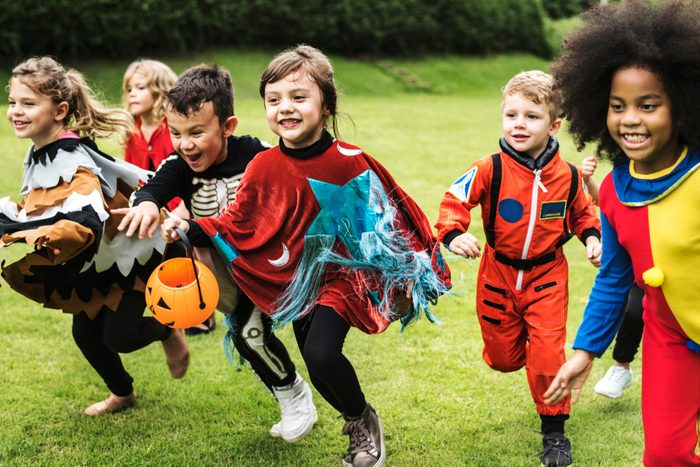
2. Supervise young children
Make sure kids walk instead of run. Even though it might be tempting to wait at the end of the street or cul-de-sac, parents should stay close by as children go door-to-door. Dr. Raja explains younger kids aren’t generally used to walking around the neighborhood at night when it’s dark out. He suggests waiting at the curb by each house, instead of giving them too much autonomy. Franks reminds trick-or-treaters to use cross-walks and sidewalks as they would on an ordinary evening—Halloween or not, the rules are the same!
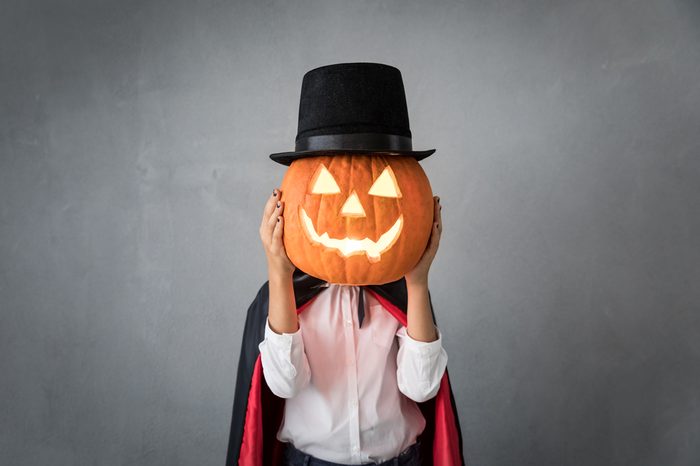
3. Make sure your kid can see
Most non-fatal accidents are from a trip or fall leading to scrapes and bruises. If the costume comes with a hat or covers the head, one of our favorite Halloween safety tips before you even walk out the door is to make sure it fits properly to prevent shifting while your kid is walking around. Dr. Raja says your trick-or-treater needs to be able to see all the way through the mask, not just partially, which could mean cutting out bigger holes in the mask.
Football Food Safety: 5 Tips for Your Next Tailgate, From a Microbiology Expert
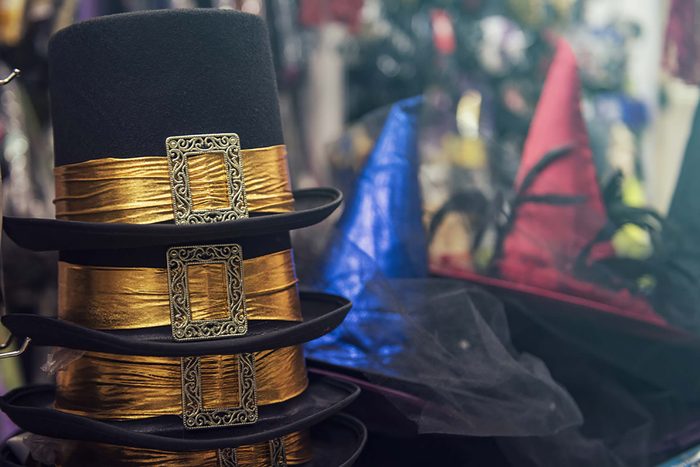
4. Pick a costume that is flame-resistant
Costumes manufactured in the U.S. are required to be flame-retardant. But Franks advises double-checking the label and being watchful for counterfeiters—that means buying from reputable sellers. Even if the costume is flame-resistant, though, don’t let your kid sleep in it. Dr. Raja says the costume can sometimes be too tight around the arms, legs and neck. “They look great, but when the night is over, it’s time to change into PJs.”
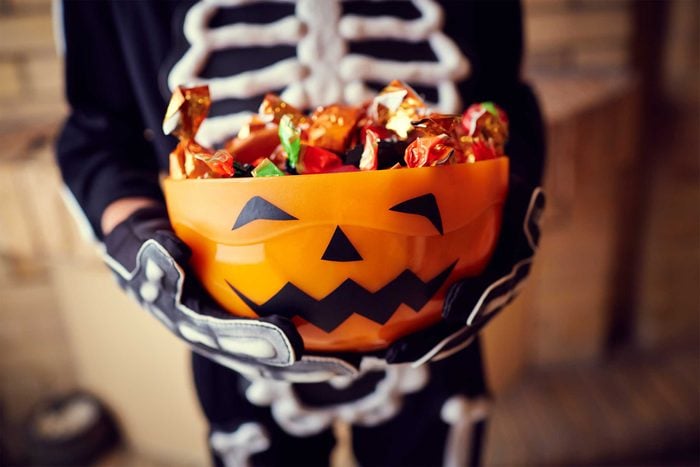
5. Examine all treats
While sorting through your kid’s candy, remove any items that could be a choking hazard, especially if you have younger children. If anything looks tampered with, don’t take the risk—just toss it in the trash. While homemade items are tasty, when it comes to trick-or-treating, the Centers for Disease Control and Prevention (CDC) advises sticking to factory-wrapped treats. And while it’s fun to spread your candy out on the floor to separate it out, make sure to keep it away from your canine friends!
Top 4 Worst Halloween Candy for Your Teeth, According to a Dentist
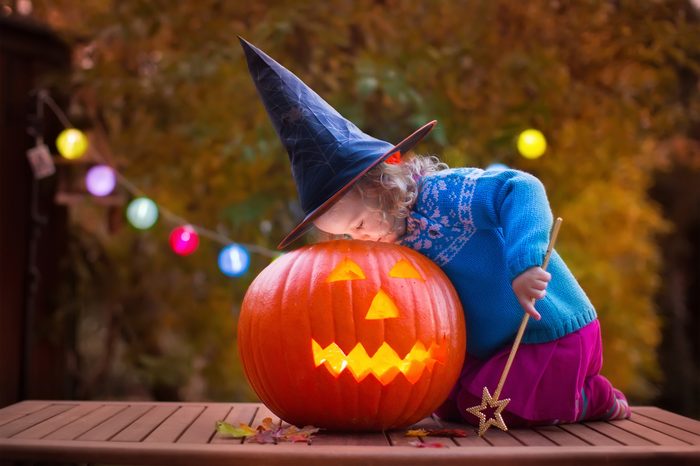
6. Choose safe accessories
If your little devil wants to carry a pitchfork, just make sure it’s safe. One of Franks’ Halloween safety tips is to choose flexible and lightweight materials, such as cardboard and foam—perfect if you’re making a homemade costume! If swords and sabers are part of the attire, talk to your kid about keeping them away from other trick-or-treaters’ faces, especially their eyes. When it comes to ropes or lassos, make sure they don’t go around your kid’s neck—try angling it across the shoulder instead.
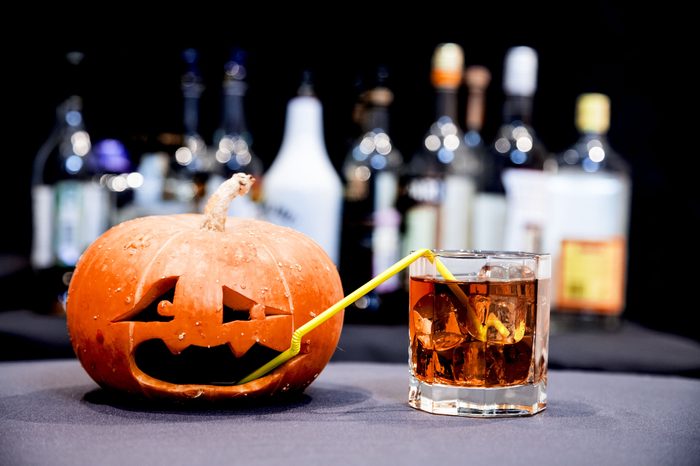
7. Be cautious with alcohol
Know the three top signs of alcohol impairment: Reduced coordination, slurred speech and lack of concentration. Even at a low-key family hang-out, it’s important for teens to realize just because they see others drinking alcohol doesn’t make it okay for them, says Dr. Raja. For adults at a party, he suggests drinking one cup of spiked punch, then waiting an hour to see how it affects you—especially if you don’t know what’s in it. Drunk driving is more common on Halloween, so use a rideshare app or assign a designated driver.
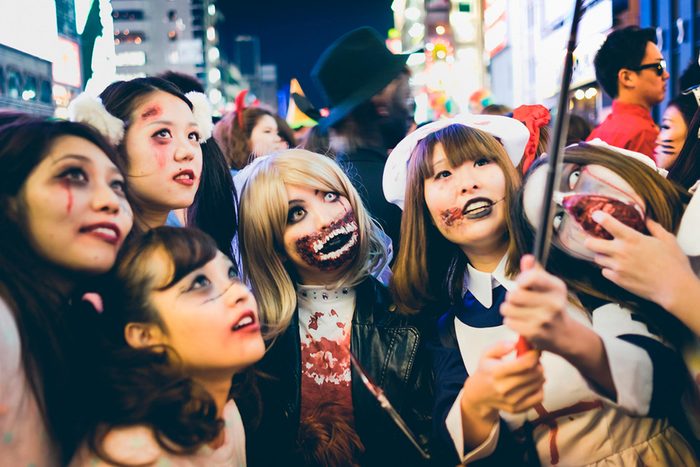
8. Talk to your teens about being smart
Discuss pills and vaping, and share your honest expectations. Parents should lock up their pharmaceuticals on Halloween since trends show young adults are going for a variety of pills, not just opioids. Some teens end up with blood pressure medicine or a prescription intended for diabetes when they are looking for something to give them a high. But these types of pills could lower their blood pressure and/or blood sugar levels too much, says Dr. Raja. He adds, “Treat vaping like cigarettes,” noting that your kid could become addicted after trying it once.
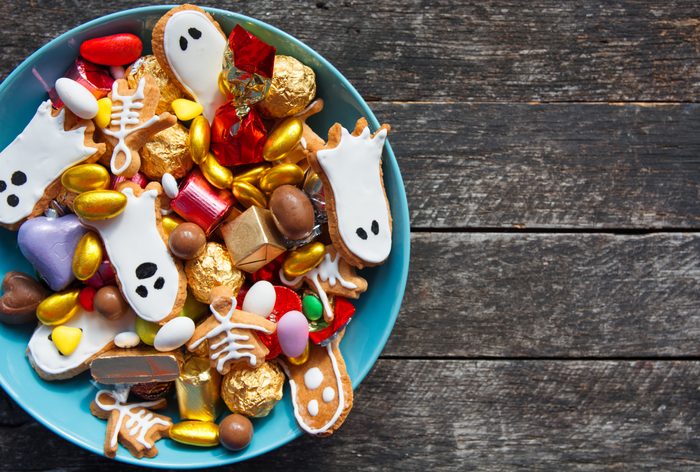
9. Limit the amount of candy
This one’s tricky no matter what age you are. For school-aged children, Dr. Raja suggests limiting their candy to between six and eight pieces (not full-sized candy bars) total for the night. That might seem strict, but kids need to function the next day at school, and sugar adds up fast. Excess sugar energizes them, making it harder to fall asleep; plus, the crash continues on into the next day. “Portion out the candy over the next week or even the next month. Explain you don’t want them to get an upset stomach.”
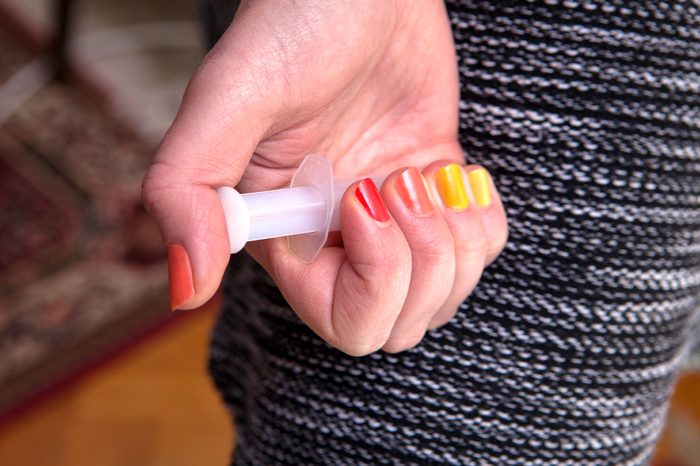
10. Plan ahead for health conditions
If your kid has a food allergy or diabetes you’re always on guard—but Halloween can sneak up on the most careful parents. When your kid is walking from one house to the next they could be sneaking a few bites of treats they shouldn’t eat. Dr. Raja suggests offering some sugar-free candies (if they have diabetes) or an allergy-friendly option before leaving your house. Bring the EpiPen just in case, and make sure to check over the ingredients of the remaining candy when you get home.
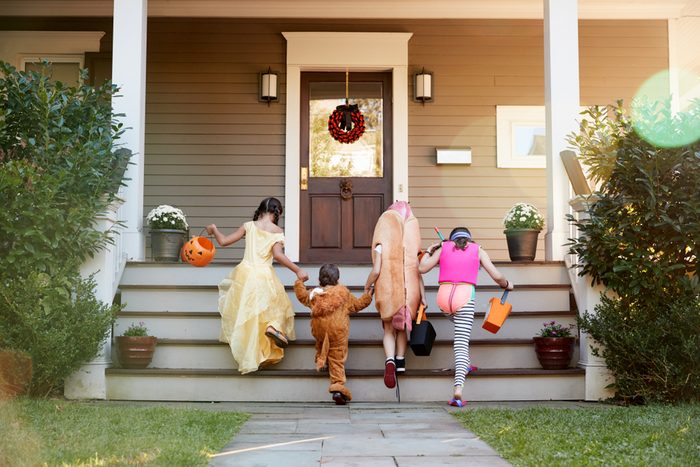
11. Stay in groups
It’s important to stay together, but not just because there’s safety in numbers. This applies to all age groups because it will help everyone avoid traffic accidents and getting lost, says Dr. Raja. For teens, it’s important to talk about sexual assault too, including ways to stay safe. Tell them it’s okay to leave a situation that makes them feel uncomfortable and that they can call you to come get them. The CDC suggests only visiting well-lit houses and reminds trick-or-treaters to never accept rides with strangers.
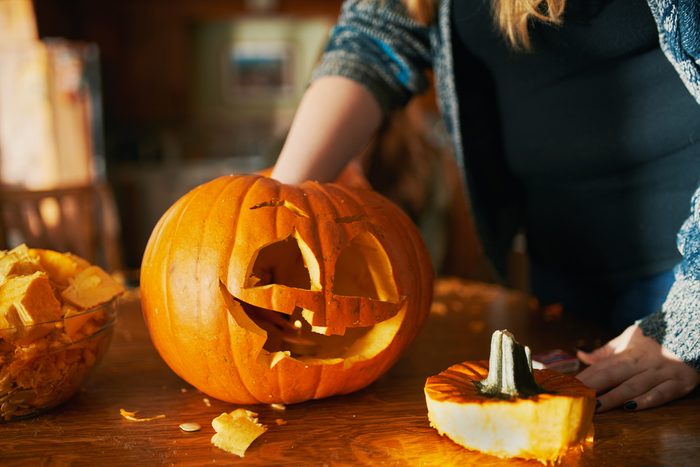
12. Use a pumpkin carving kit
A kitchen knife is a bad idea for carving your pumpkin—especially the large ones. If your only option is a kitchen knife, Dr. Raja suggests using a paring knife, since it’s smaller and typically not as sharp. He’s seen multiple hand-cutting accidents in the ER for adults and kids; for maximum safety, he says you should spend the five bucks and get a pumpkin carving kit. As an alternative, kids can paint their pumpkin, adding stickers and glitter for fun (plus your pumpkin will last longer).
I Ate Pumpkin Seeds Every Day for a Week—Here’s What Happened

13. Use caution when lighting your pumpkin
Because some people light traditional candles inside their pumpkins for that eerie jack-0′-lantern glow, the risk of house fires goes up on Halloween. Dr. Raja suggests trying LED tea lights instead. Battery-operated candles are another option, says Franks. If you opt for traditional candles, she suggests keeping jack-o-lanterns away from doorsteps and walk-ways. Also, remember to blow them out before you go inside.
The History of Jack-o’-Lanterns and How They Became a Halloween Tradition
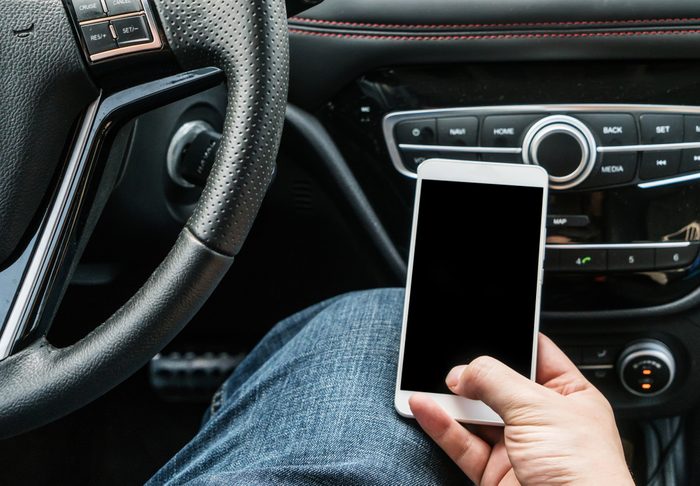
14. Put your cell phone down
This might seem obvious, but it applies to all ages—especially when you’re driving! It might be tempting to post a quick pic to social media after leaving the party, but wait until you are safely stopped. Franks reminds trick-or-treaters of all ages to look left, then right, then left again when crossing the street. Her simple safety slogan is, “Head up and phone down.” While it applies to ordinary evenings when you’re out walking or driving around town, it’s especially important to stay alert on Halloween when there’s more foot traffic.
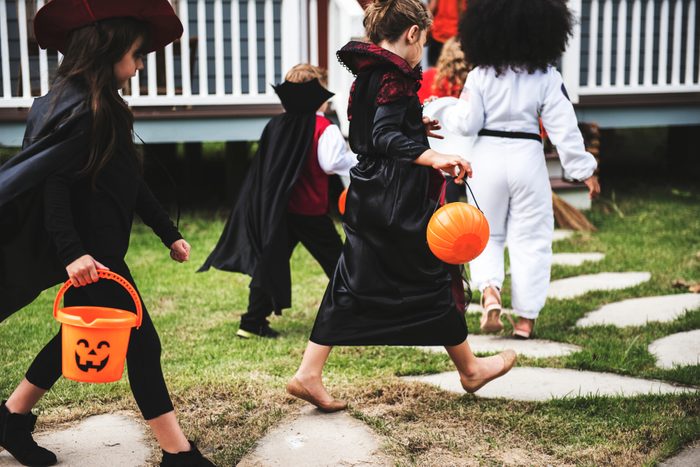
15. Follow a plan
Being spontaneous is exciting, but sticking to a schedule is safer. Franks suggests talking with your tween or teen about the route they will be taking. She also says it’s important to give them a curfew. By arranging details ahead of time (like knowing who they will be walking with), you will be on the same page with clear expectations. You can even set up Find My iPhone or Family Link for Android to track your kid throughout the evening.
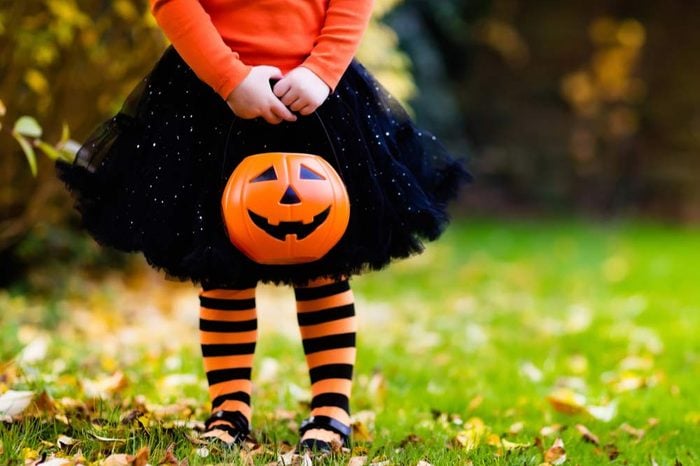
16. Stay warm
Cold weather can depress your immune response and leave you vulnerable to germs, points out Dr. Raja. He suggests buying a costume one size too big so your kid can wear a sweatshirt underneath and still look cool in their costume. Also, bring some hand sanitizer to use after touching those doorknobs and doorbells—and before diving into the candy bag.
For more wellness updates, follow The Healthy on Facebook and Instagram. Keep reading:

